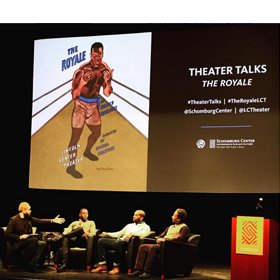One night this week – when the temperatures edged back into the forties and the blizzard was almost a memory – three cast members from The Royale gathered at the Schomberg Center for Research in Black Culture, in Harlem. With Andrew Shade, creator of blackbroadway.com, as moderator, they – McKinley Belcher III, Khris Davis, and Clarke Peters -- discussed a variety of subjects, and finished by taking questions from the audience that had assembled at the Schomberg’s Langston Hughes Auditorium.
Jack Johnson – photos of him had been flashed on a large screen before the discussion – was an initial topic. The actors stressed that The Royale was inspired by the life of Johnson, who, a century ago, was the first African-American heavyweight champion of the world, but that the drama was not telling his story exactly.
Davis, who plays the Johnson-like figure (called Jay Jackson), said that the play “is about his internal struggle with himself, with the people around him, and his family.” He added: “I read the script and I wanted to be a part of [the project] because of the history.”
Peters said that the play “is going to be uncomfortable for some people,” explaining: “What’s presented to Jay are the ramifications of his success on his community.” Belcher elaborated: “Johnson wanted to be the best but the world wasn’t ready to see someone who was the best and who didn’t look like all of them.”
It was clear from the relaxed interplay between the actors that they are forming solid friendships in the rehearsal room. (As the first preview isn’t until February 11th, they stressed that they were still finding their way into the play while enjoying the camaraderie.)
And they are learning about each other. Belcher and Davis for example, had just discovered that Peters had written the book to the 1990 Broadway musical hit, Five Guys Named Moe. Peters said that the Five Guys success “didn’t change what I was as much as it changed how people responded to me.” He was especially appreciative of how the musical’s success introduced him to such legendary talents as Elisabeth Welch, a singer and actor whose career spanned seven decades.
Peters said that any long career, his own included, has its high and lows, just as “the tempo of a boxing match has its highs and lows.” All three actors stressed the way that tempo figures into The Royale. The play is percussive, with the actors’ clapping and verbal delivery giving metaphorical punch. (No punches – boxing blows – are exchanged between characters against each other literally.)
Davis spoke to the ups and downs of Jack Johnson’s life. Before researching his role, Davis said, “I didn’t know how tragic the end of [Johnson’s] life was.” American society “took this self-made king and turned his life into a sideshow.”
At the end of the Schomberg evening, audience questions prompted a discussion proving that the concerns of The Royale are much larger than those of one man’s story – that of Jack Johnson or of his Royale counterpart, Jay Jackson. Such matters would require a much longer blog entry to assess in detail. I will say only that, when asked whether the situation of a talented African-American trying to succeed has changed in the century since Jack Johnson, Peters replied: “The goalposts have changed but the game is still the same.”
Brendan Lemon is the editor of lemonwade.com.
